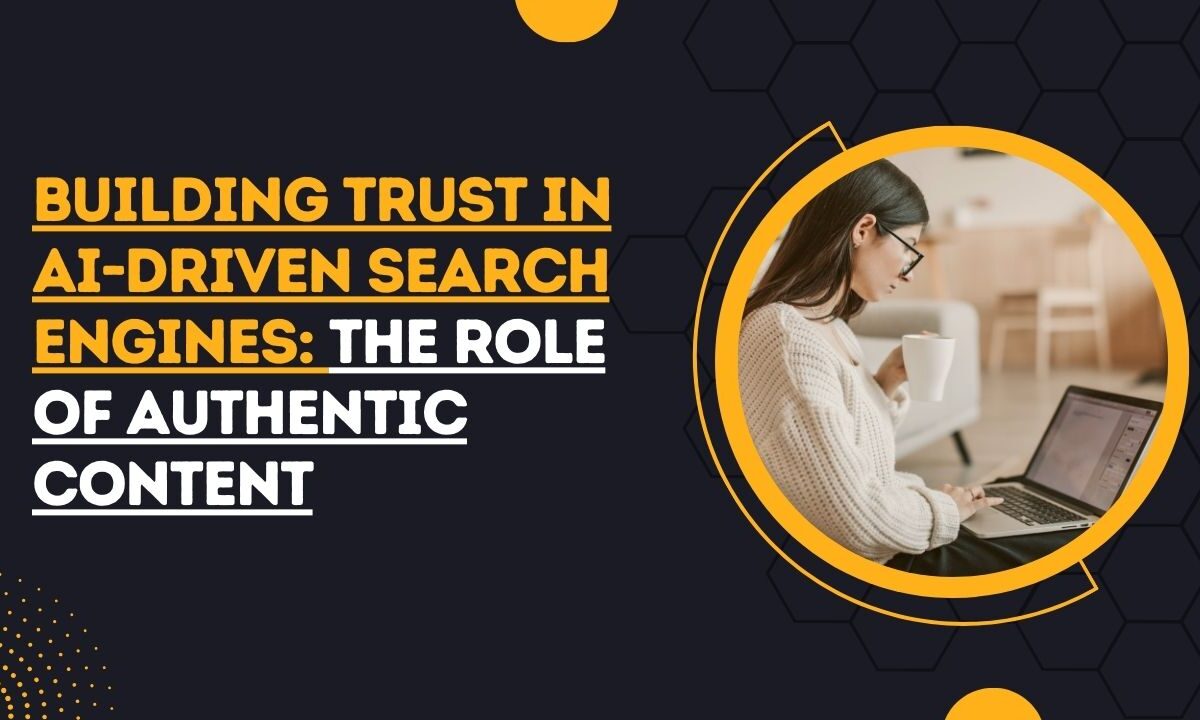Building Trust in AI-Driven Search Engines: The Role of Authentic Content
Trust and authenticity of AI-search engines are crucial as AI transforms the way we search for information.
While search engines become smarter, they also face the challenge of building and maintaining trust in their results.
With AI-driven search engines shaping how we access knowledge, one critical factor in this evolution is trust and authenticity in the AI age.
But here’s the big question—how can search engines maintain trust when everything is being filtered through algorithms?
How can we ensure that what we’re seeing isn’t just curated for clicks? But is, in fact, truthful and authentic?
In this article, we’ll explore the relationship between trust, authenticity, and AI-powered search engines.
We’ll also explore why authentic content plays a pivotal role in fostering a genuine relationship with users.
Why Trust is the Cornerstone of AI Search Engines
Imagine you’re looking for a recommendation on the best type of sneakers.
You enter your query into a search engine, and voilà—you’re given a list of the most popular brands.
But what if those results are influenced by paid ads and algorithms that prioritize traffic over quality?
Would you trust the search engine?
Probably not.
Trust is everything.
IBM articulates this need for trust precisely when it says, “to trust a decision being made by an AI algorithm, you need to know that it’s fair, accurate, ethical and explainable.“
When we search for information online, we want to feel confident that what we’re being shown is accurate, transparent, and unbiased.
AI-driven search engines are no different; they need to earn that trust.
The AI age is characterized by vast amounts of data being processed at lightning speed.
But just because data is abundant doesn’t mean it’s all useful or reliable.
Authenticity in content is key.
When users can trust the search engine to deliver honest, relevant, and verified information, they’ll keep coming back.
Read More: AI-Generated Content: Trustworthy Innovation or Digital Deception?
The Role of Authentic Content in AI Search
Let’s think about authentic content for a moment.
It’s like the difference between eating a home-cooked meal versus grabbing fast food.
One is rich in nutrients, prepared with care, and serves your true needs.
The other might satisfy a quick craving but doesn’t provide lasting value.
Similarly, authentic content serves the user’s genuine need for accurate information.
But how can we cultivate this authenticity in AI search engines?
- Quality over Quantity: AI should prioritize content that adds value rather than overwhelming users with irrelevant or clickbait material.
- Transparency: Search engines need to be transparent about how content is selected and ranked. Let users know why a particular result is appearing at the top of their search query.
- Credibility Indicators: Search engines can integrate credibility indicators, such as verified sources, expert authors, or fact-checked articles, to ensure the content they serve is authentic.
The Trust Equation: AI, Authenticity, and User Experience
Let’s break it down:
Trust = Authentic Content + Transparency + Credibility.
When search engines align with this equation, the experience becomes more meaningful and reliable.
Elements of Trust in AI Search Engines
| Element | Description | Impact on User Trust |
|---|---|---|
| Authentic Content | Content that is original, valuable, and accurate. | Increases user confidence in search results. |
| Transparency | Clear information on how search results are ranked. | Builds credibility and reduces skepticism. |
| Credibility | Credible, fact-checked, and expert-backed content. | Fosters trust and reduces misinformation. |
| Personalization | Tailored search results based on individual needs. | Enhances user satisfaction and relevance. |
| Reliability | Consistency in delivering quality results. | Strengthens trust over time through a dependable system. |
FAQs
- How do AI search engines ensure the authenticity of content?
AI search engines use algorithms to assess the credibility of sources and prioritize fact-checked, high-quality content. - Can AI distinguish between authentic and inauthentic content?
Yes, AI can analyze factors like source reputation, author expertise, and data-backed information to gauge authenticity. - Why is transparency important in AI search?
AI transparency helps users understand how content is ranked, building trust in the search engine’s processes. - What role do credibility indicators play in AI-driven search?
Credibility indicators signal to users that the content they’re consuming is reliable, fostering a trustworthy user experience. - How can authenticity in AI search benefit users?
Authenticity ensures that users receive accurate, reliable, and meaningful information, enhancing their search experience.
Related Posts
How AI Content Earns Our Trust One Step at a Time
Cultivating Trust in The AI Search Age: The Power of Authenticity
Why Human Bloggers Will Thrive in an AI-Age—If They Do This
Authenticity Over AI Automation: Crafting Blogs AI Can’t Mimic
Conclusion
Trust and authenticity isn’t built overnight by AI-Search engines
You cultivate it over time through the consistent delivery of authentic content.
As AI continues to grow and evolve, search engines must focus on reinforcing trust and authenticity in the AI age. When AI-driven systems prioritize authenticity, users will start trusting them more.

